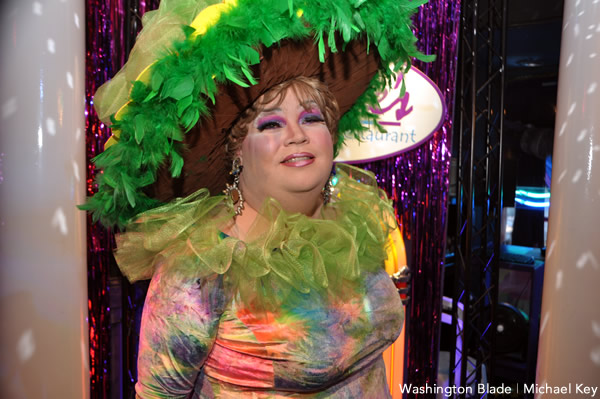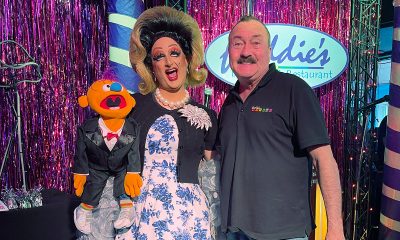Living
Queery: Daniel L. Hays
Legislative analyst by day, drag performer by night


Daniel L. Hays a.k.a. Muffy Blake Stephyns (Washington Blade photo by Michael Key)
When Daniel L Hays moved to the Washington area in 2006 to take a job as a legislative analyst with the U.S. Department of Labor, he thought the drag he’d done back in his native Missouri was behind him.
And for his first few years in D.C., that was the case.
“I called my drag family in, said, ‘Here’s all my stuff,’ and they basically took it all. I thought I was done,” Hays says. “I just didn’t think I’d ever do it again. But I met up with the Bottoms clan and they had seen photos of what I’d done before so that’s when it started up again in about 2010.”
Known these days as Muffy Blake Stephyns — she had different last names in different iterations — Hays says drag is both a way to unwind and give something back.
“I love that I can be involved and bring awareness to other groups through charity shows,” he says.
That’s exactly how it started with his work with the Arlington Gay & Lesbian Alliance (AGLA). The group has its Miss Gay Arlington pageant tonight at 8 p.m. at Freddie’s Beach Bar (555 23rd Street, Arlington; $10 cover) where contestants will be judged in several categories in an event dubbed “The Glittery Rainbow Connection.” Reigning Miss Gay Arlington Stardust will be honored and a prize package valued at $900 is at stake. Details are available at agla.org.
Miss Gay Arlington started in 2011. Hays, crowned in January as Miss Gay Zodiac in the Academy of Washington, says it’s a way to “increase awareness and activities of AGLA events with a different demographic of people.”
Hays, 38, and his partner Patrick Frieslander, live in Old Town Alexandria with their two cats Xena and Cleo. He enjoys politics, drag, singing, antiques, travel and LGBT activism in his free time.
How long have you been out and who was the hardest person to tell?
I have been totally out since 2004, though most responded with, “Yes, I know.” 2004 is when “the conversation” was had with my father. My father was the hardest to tell, in large part because he is a Southern Baptist deacon.
Who’s your LGBT hero?
Harvey Milk. I keep a poster in my cubicle with a picture of him and his famous “you gotta give ‘em hope” quotation.
What’s Washington’s best nightspot, past or present?
The best place to be is not any particular establishment; it’s wherever my friends are. But if I have to choose a bar I would say Freddie’s, which makes everyone feel at home, even our straight allies. And Freddie does so much to support the community.
Describe your dream wedding.
A gathering of my family (biological and drag) along with a few other close friends to witness my partner and I commit our lives to one another, followed by a destination honeymoon with a few of our closest friends being invited to join us as we celebrate the happiest day of our lives.
What non-LGBT issue are you most passionate about?
Health care. I have had epilepsy since I was 13 years old. I am fortunate to have always had health insurance; otherwise the medical bills would have eaten me alive. A nation with the riches we collectively have should not have anyone being forced to make decisions about whether to get treatment or take medication based upon their ability to pay.
What historical outcome would you change?
In recent history I would have changed the outcome of Bush v. Gore and had Al Gore sworn in as the 43rd president of the United States.
What’s been the most memorable pop culture moment of your lifetime?
The funeral of Princess Diana.
On what do you insist?
Being true to myself, and not caving to the pressures of society to conform to a particular image or stereotype. I have been fortunate to have an incredible drag mother, Shelby Blake Stephyns, who taught me this.
What was your last Facebook post or Tweet?
As you make your plans for the weekend remember to join us for the 2013 Miss Gay Arlington pageant on Friday at 8 p.m. at Freddie’s Beach Bar.
If your life were a book, what would the title be?
“Christian Panties: The Secret to Good Livin’”
If science discovered a way to change sexual orientation, what would you do?
Say thanks but no thanks. I am just fine the way God made me. I’m going to continue being true to myself.
What do you believe in beyond the physical world?
I believe in God, however I don’t buy into the idea that any one religious sect has a claim on what/who God is. For me, God is a higher power that transcends religious and cultural divides and calls us each to be the best we can be, and in the process fulfilling his/her image of us.
What’s your advice for LGBT movement leaders?
Stick to the basics. The goal is equal rights for all. We are not after gay rights, or some special treatment; we are after equal rights for all, no exceptions.
What would you walk across hot coals for?
Lady Bunny’s wigs — I live for big hair.
What LGBT stereotype annoys you most?
Discrimination in any form annoys me. Unfortunately too many times the LGBT community falls into the trap of discriminating against and among us.
What’s your favorite LGBT movie?
“Sordid Lives”
What’s the most overrated social custom?
Most all of them — be true to you.
What trophy or prize do you most covet?
I’ve never really set my life goals around trophies or prizes. That being said winning the title of Miss Gaye Zodiac (D.C.) was a great honor, but RuPaul if you are reading this I’d love to headline your next tour.
What do you wish you’d known at 18?
The freedom that being true to one’s self brings.
Why Washington?
A job that pays the bills!
Real Estate
Boosting your rental property’s curb appeal
Affordable upgrades to attract and keep tenants happy

In the District of Columbia, the rental market tends to open up significantly during the springtime for several reasons. First, spring brings about a sense of renewal and change, prompting many individuals and families to seek new living arrangements or embark on relocations. Additionally, the warmer weather and longer daylight hours make it more conducive for people to explore housing options, attend viewings, and make decisions about moving. Furthermore, spring often coincides with the end of academic terms, leading to an influx of students and young professionals entering the rental market.
Landlords and property managers also tend to schedule lease renewals or list new vacancies during this time, capitalizing on the increased demand and ensuring a steady turnover of tenants. In the competitive world of rental properties, attracting and retaining quality tenants can be challenging. However, with some strategic upgrades, property owners can significantly enhance their units’ appeal without breaking the bank. From enhancing curb appeal to interior upgrades, here are some practical and cost-effective ideas to make your rental property stand out in the market.
Curb appeal
First impressions matter, and curb appeal plays a crucial role in attracting potential tenants. Simple enhancements like freshening up the exterior paint, adding potted plants or flowers, and ensuring a well-maintained lawn can instantly elevate the property’s appearance. Installing outdoor lighting not only adds charm but also enhances safety and security.
Interior upgrades
Upgrade the kitchen and bathroom fixtures to modern, energy-efficient options. Consider replacing outdated appliances with newer models, which not only appeal to tenants but also contribute to energy savings. Fresh paint and updated flooring can transform the look of a space without a hefty investment. Additionally, replacing worn-out carpets with hardwood or laminate flooring can make the unit more attractive and easier to maintain.
Enhance storage
Maximize storage options by installing built-in shelves, cabinets, or closet organizers. Tenants appreciate ample storage space to keep their belongings organized, contributing to a clutter-free living environment.
Improve lighting
Brighten up the interiors by adding more lighting fixtures or replacing old bulbs with energy-efficient LED lights. Well-lit spaces appear more inviting and spacious, enhancing the overall ambiance of the rental unit.
Upgrade window treatments
Replace outdated curtains or blinds with modern window treatments that allow natural light to filter in while offering privacy. Opt for neutral colors and versatile styles that appeal to a wide range of tastes.
Focus on security
Invest in security features such as deadbolts, window locks, and a reliable alarm system to ensure the safety of your tenants. Feeling secure in their home is a top priority for renters, and these upgrades can provide meaningful, genuine peace of mind.
Enhance outdoor spaces
If your rental property includes outdoor areas like a patio or balcony, consider sprucing them up with comfortable seating, outdoor rugs, and potted plants. Creating inviting outdoor spaces expands the living area and adds value to the rental property.
As landlords, investing in the enhancement of your rental properties is not merely about improving aesthetics; it’s about investing in the satisfaction and well-being of your tenants, and ultimately, in the success of your investment. By implementing these practical and affordable upgrades, you’re not only increasing the desirability of your units but also demonstrating your commitment to providing a high-quality living experience.
These efforts translate into higher tenant retention rates, reduced vacancy periods, and ultimately, a healthier bottom line. Moreover, by prioritizing the comfort, safety, and happiness of your tenants, you’re fostering a sense of community and trust that can lead to long-term relationships and positive referrals. So, let’s embark on this journey of transformation together, turning rental properties into cherished homes and landlords into valued partners in creating exceptional living spaces.
Scott Bloom is owner and Senior Property Manager of Columbia Property Management. For more information and resources, visit ColumbiaPM.com.
Real Estate
Real estate agents work hard for that commission
Despite recent headlines, buyers and sellers benefit from our expertise

With there being a lot of noise in the media lately as I am sure you have read and heard headlines like “Gone are the days of the 6% commission” and “End of the good days of Realtors,” etc., I wanted to re-run a very short article of the long laundry list of things that well versed real estate agents bring to the table to earn that seldom 6% commission. It’s typically split in half and it has always been negotiable).
As a real estate professional you will go on listing appointments and buyer meetings to not only attempt to gain business but in doing so you also educate the general public on what it is that we as real estate professionals do. I know what you’re thinking – and if you’ve seen my photo before you wouldn’t be wrong to assume that I am cast in “Selling DC” as the lead villain. I am just waiting for that phone call! But in all seriousness, when I sit down to come up with a list of things to prove to prospective clients the value in working with me as their real estate professional, I am pretty blown away at the items and qualities that a trusted professional representing you in a real estate transaction is responsible for managing a myriad of tasks, including but not limiting to the following:
• Have a pulse on the marketplace to truly understand exactly what is happening from a buying and selling standpoint while also understanding the economic side of things – not just looking at interest rates. Why are rates where they are? What employers are laying off and could cause an influx of inventory? What are the trends for individuals moving IN or OUT of an area looking like? Forecasting the marketplace of all things that truly affect real estate is vital.
• Soft Skills – these are the skills often considered as customer service skills. The ability to be approachable by all types of people and ensure that you are open to receive information. Also – when telling you bad news – it’s important to ensure that it is done in a manner in which you, the receiver, will be pleasantly receptive.
• Pre-market vendors – not only are real estate professionals expected to market your home for sale or locate a home for you to purchase, we are also expected to have a list of pre-market vendors to which you can use for your lending needs, home inspection, title work, any fluffing and buffing needed pre market for the sale of your home such as a contractor, painter, landscaper etc. We have a book of extremely well vetted vendors that either I personally have used or past clients have used that can assist with your needs. This beats Googling for hours and accidentally choosing the wrong contractor. Section A of the pre-market vendor list includes those in which we real estate professionals use for marketing materials for your property – we will use the best photographers, have floor plans drawn for your property, video, staging, catering for brokers opens and the list goes on. Again – this is a well vetted list that we have worked on for years and done all of the heavy lifting and had those uncomfortable conversations when things are not properly executed – so you don’t have to.
• On Market Tasks – these are the tasks that most clients are unaware that we do. Oftentimes when a listing is on market – folks think that I am just cruising around in my convertible buying nice things. However I am in fact going around checking each listing on market to ensure that they are clean, the booties are replaced, marketing materials are stocked, light bulbs are all working, staging looks crisp and the list truly goes on. That of course, doesn’t include the tasks we do to properly market the property such as weekly email blasts, reaching out several times to follow up with showing agents to get their feedback, check the market to see what our competition looks like, what’s under contract and why, and again…..I could go on. Needless to say the most important and time consuming tasks are those that are done when the property is on market.
• “Contract to close” management – the term contract to close is pretty much what it sounds like – it’s what happens from the time we go under contract until we reach the closing finish line and you have those keys. Once a trusted real estate professional has fiercely negotiated on your behalf as a buyer, the fun starts. Again pops up this vendor list – helping guide you though selection of a home inspector, termite inspector, etc. for the inspections. A title attorney is needed (depending on your jurisdiction) and any other vendors for quotes like renovations, etc., that you might want done to the property. Once the inspection is completed and we go through possible re-negotiations then we must ensure that the lender has the documents needed from you completed in order to have the appraisal done to prove the value of the home you are under contract for. Now we are getting into the weeds – but once we are on the other side of things and the appraisal comes back at value and the loan is clear to close then we are at the finish line to your new home.
A similar story can be told if you are selling your home. The appraisal is a very important part of the checklist as that is the value in which your home is worth. The appraiser is a third party that neither the buyer, seller, lender or myself have any allegiance to. I do, however, have the duty to educate said appraiser on why I chose the listing price and how I came up with that value.
• Post-market vendors. As mentioned before, a real estate professional should have a book of well vetted vendors from which to choose. Looking at the list of vendors now that we are on the other side of the table – I can provide a cleaning person, HVAC contractor, someone to repair the sprinkler system, a dog walker, the best caterers and bakery in town. Further down the road I am able to provide a wonderful wealth manager who can tell you what to do with that piece of real estate you purchased some time ago and we could go on for days.
While you are fully entitled to not use a real estate agent during your real estate transaction, I do believe that it is well within the realm of possibilities to say that without one there would be loose ends not completely tied up, things mismanaged and possible delays that could cost real cash. All of that aside, it is also such a truly wonderful experience to work alongside a trusted professional that at the end of the transaction becomes a new friend and family member. Real estate professionals love what they do, they love real estate and people and sheepherding you through the home buying or selling process is what it’s all about to us.
Justin Noble is a Realtor with Sotheby’s international Realty licensed in D.C., Maryland, and Delaware for your DMV and Delaware Beach needs. Specializing in first-time homebuyers, development and new construction as well as estate sales, Justin is a well-versed agent, highly regarded, and provides white glove service at every price point. Reach him at 202-503-4243, [email protected] or BurnsandNoble.com.
Real Estate
Do you need title insurance?
Facilitating smoother and more efficient real estate transactions

A title search is an examination of public records to determine the legal ownership of a property and identify any claims or liens against it. This comprehensive investigation delves into deeds, mortgages, court records, tax records, and other documents related to the property’s history. The objective is to verify that the seller has the legal right to transfer ownership of the property and that there are no undisclosed issues that could cloud the title.
I would surmise that most buyers have never read their title report or policy and I confess that I was one of them until 2005, when I bought a house in San Diego. While I was “in escrow,” my agent presented me with a title report. My first reaction was, “What do I do with this?” He replied, “review it and sign indicating that it is acceptable.” I had no idea what to look for, since I had always had title companies to rely on for interpreting the results. Thankfully, it was a clean report with no liens on it other than the mortgage the seller would be paying off at settlement.
Here, only if anything is amiss will the title attorney notify the agents and advise what the parties need to do to satisfy any conditions that could prevent them from closing. Otherwise, you won’t see the report up front.
Why are title searches important?
- They verify the seller’s legal right to transfer ownership of the property, providing assurance to the buyer that they are purchasing a legitimate asset.
- They identify any outstanding liens, mortgages, or other encumbrances that could affect the property’s value or the buyer’s ability to obtain financing.
- A title insurance policy provides coverage for losses arising from title defects such as disputes, undisclosed easements, forgery, or fraud, offering peace of mind to both buyers and lenders.
The process starts with the retrieval of documents from various sources, including county clerk offices, tax assessor’s offices, and court records.
The records are then inspected to trace the chain of ownership and identify any potential issues. The title examiner verifies the accuracy of legal descriptions, checks for inconsistencies or errors, and identifies any red flags that may indicate title defects.
If found, resolution of issues or discrepancies, such as unpaid taxes, outstanding liens, or boundary disputes must be addressed before the transaction can proceed. This may involve negotiating with creditors to satisfy outstanding debts, requesting more information from sellers, and resolving legal disputes.
Once complete, the firm will issue a title report on which to base a title policy. The buyers will receive a copy at settlement. The report provides a detailed summary of the property’s ownership history, any encumbrances or defects found during the search, and recommendations for mitigating risks.
Title insurance for the lender is required, but buyers often ask whether they need owner’s title insurance coverage too. I always recommend buying an owner’s policy. If a buyer chooses not to, then only the lender is protected from any claims revealed after the issuance of the title report. For a one-time fee, an owner’s policy protects your interest in the property and that of any heirs from future claims until the house is ultimately sold.
For example, I attended a settlement with a buyer who was purchasing a rowhouse. A woman who had power of attorney to sign for the seller was also there and, because he was overseas, the actual seller was on speaker phone to address his concerns or ask any questions.
The closing agent began reading the settlement statement aloud to indicate what was being deducted from the seller’s proceeds. The seller was fine with the amount shown for the remainder of his first mortgage, but when she read out the amount of the second mortgage, the seller, now agitated, asked, “What second mortgage?”
It then became clear that the woman, the owner’s former fiancée, had used her power of attorney to obtain a second mortgage after the title search had been done. Thanks to the title companies’ involvement, the seller was able to post a bond for the missing funds to allow settlement to proceed while he took on a legal battle with his former fiancée. Don’t try this at home, kids.
By uncovering potential issues early in the process, title searches help facilitate smoother and more efficient real estate transactions by resolving issues upfront, ensuring a seamless transfer of property ownership. But nobody knows when great Uncle Bob or your former tenant may show up with a claim to the house. You’ll need your owner’s title policy to have someone on your side.
Valerie M. Blake is a licensed Associate Broker in D.C., Maryland, and Virginia with RLAH Real Estate / @properties. Call or text her at 202-246-8602, email her via DCHomeQuest.com, or follow her on Facebook at TheRealst8ofAffairs.
-

 Africa4 days ago
Africa4 days agoCongolese lawmaker introduces anti-homosexuality bill
-

 District of Columbia1 day ago
District of Columbia1 day agoReenactment of first gay rights picket at White House draws interest of tourists
-

 World4 days ago
World4 days agoOut in the World: LGBTQ news from Europe and Asia
-

 Arizona1 day ago
Arizona1 day agoAriz. governor vetoes anti-transgender, Ten Commandments bill










